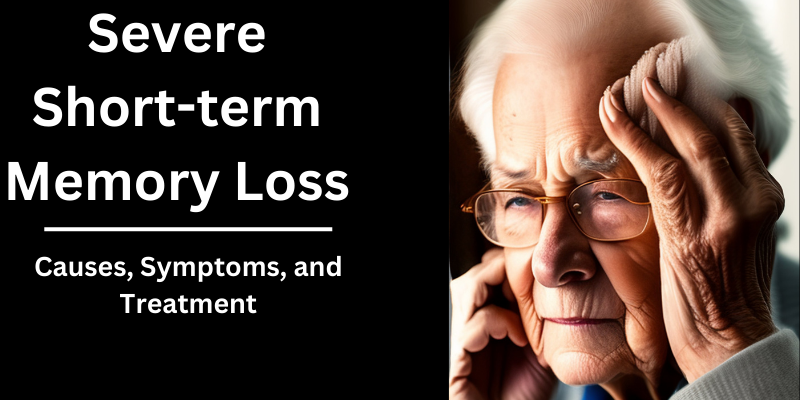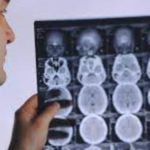Severe Short-Term Memory Loss: Causes, Symptoms, and Treatment
Severe short-term memory loss can be caused by various factors, including brain injuries, infections, or neurological conditions such as Alzheimer’s disease. Treatment options may depend on the underlying cause and may include medication, therapy, or lifestyle changes. It’s important to consult with a healthcare professional for proper diagnosis and treatment.

Introduction
Definition of Severe Short-Term Memory Loss
Severe short-term memory loss refers to a significant and often sudden impairment in the ability to remember new information and events for a brief period of time, usually ranging from seconds to minutes. This can greatly impact daily functioning and require medical attention.
Importance of Understanding the Causes, Symptoms, and Treatment Options
Understanding the causes, symptoms, and treatment options of severe short-term memory loss is crucial for both individuals experiencing memory loss and their loved ones. By identifying the underlying cause, individuals can receive proper treatment and improve their quality of life.
Recognizing the symptoms can also lead to early intervention, which can prevent further cognitive decline. Additionally, knowing about treatment options and coping strategies can provide support and hope for those affected.
Understanding Severe Short-Term Memory Loss
What is Short-term Memory and How is it Different from Long-term Memory?
Short-term memory refers to the ability to hold and manipulate information in the mind for a brief period of time, usually ranging from a few seconds to a minute. This type of memory is used to perform tasks that require temporary storage of information, such as remembering a phone number or a short list of items.
Long-term memory, on the other hand, is the ability to store and retrieve information over an extended period of time, from several minutes to a lifetime. This type of memory is used to recall past events, knowledge, and experiences.
Unlike short-term memory, long-term memory has an unlimited capacity and can be strengthened with repetition and rehearsal. The transfer of information from short-term memory to long-term memory is a complex process that involves consolidation and storage in different parts of the brain.
Unlock Your Brain’s Potential with Neurodrine: The All-Natural Way to Boost Mental Clarity
What is Severe Short-term Memory Loss and How is it Diagnosed?
Severe short-term memory loss is a condition in which an individual experiences significant and often sudden difficulties in remembering new information for a brief period of time. This can affect daily functioning, such as completing tasks, recalling conversations, or following instructions.
To diagnose it, a doctor will typically perform a comprehensive evaluation that includes a medical history, physical examination, and cognitive assessment. The doctor may also order diagnostic tests, such as blood tests, brain imaging, or electroencephalography (EEG), to identify any underlying medical conditions that may be contributing to the memory loss.
Additionally, the doctor may ask the individual and their loved ones about the nature and severity of the memory loss, as well as any other symptoms or changes in behavior.
Causes of Severe Short-term Memory Loss
There are several potential causes of severe short-term memory loss, ranging from medical conditions to lifestyle factors. Identifying the underlying cause of memory loss is crucial for developing an effective treatment plan. Some common causes include:
- Neurodegenerative disorders: Conditions that cause progressive damage to the brain, such as Alzheimer’s disease, Parkinson’s disease, and Huntington’s disease, can impair short-term memory.
- Traumatic brain injury: A head injury or concussion can damage the brain and cause memory loss, including short-term memory loss.
- Stroke: A stroke occurs when blood flow to the brain is disrupted, leading to brain damage that can cause memory loss.
- Medications: Certain medications, such as antihistamines, antidepressants, and benzodiazepines, can interfere with memory and cause short-term memory loss.
- Alcohol and drug abuse: Chronic alcohol abuse and drug use can damage the brain and cause memory problems, including short-term memory loss.
- Nutritional deficiencies: A lack of certain vitamins and minerals, such as vitamin B1 (thiamine) and folate, can affect brain function and cause memory loss.
- Sleep disorders: Chronic sleep deprivation or sleep disorders, such as sleep apnea, can interfere with memory consolidation and cause short-term memory loss.
- Stress and anxiety: Chronic stress and anxiety can affect memory and cause short-term memory loss.
It is important to note that some causes are reversible with proper treatment, while others may be progressive and require ongoing management.
Symptoms of Severe Short-Term Memory Loss

How Does Severe Short-term Memory Loss Affect Daily Life?
Severe short-term memory loss can have a significant impact on daily life, making it difficult for individuals to complete routine tasks and function independently. Some ways that it can affect daily life include:
- Forgetting recent events or conversations, making it difficult to follow along in conversations or remember important information.
- Difficulty with new learning, such as learning new names or completing new tasks.
- Inability to remember appointments or important dates, such as birthdays or anniversaries.
- Difficulty with problem-solving and decision-making, as short-term memory is often involved in these cognitive processes.
- Challenges with completing tasks that require multiple steps, such as cooking a meal or doing laundry.
- Increased dependence on others for assistance with daily tasks.
- Feelings of frustration, confusion, and anxiety due to the challenges of living with severe short-term memory loss.
Overall, severe short-term memory loss can significantly impact an individual’s quality of life, making it important to seek proper diagnosis and treatment. With proper management, however, individuals with severe short-term memory loss can continue to lead fulfilling lives.
Specific Symptoms to Look Out For
The specific symptoms of severe short-term memory loss can vary depending on the underlying cause and severity of the condition. Some common symptoms to look out for include:
- Difficulty remembering recent events or conversations.
- Forgetting important details of daily life, such as where things are located or how to complete routine tasks.
- Repeating the same questions or statements multiple times.
- Misplacing objects or forgetting where things are located.
- Difficulty learning new information, such as names or directions.
- Difficulty following along in conversations or completing tasks that require concentration.
- Increased dependence on others for help with daily tasks.
- Changes in mood, such as irritability, frustration, or depression.
It is important to note that some memory loss is a normal part of aging, but significant or sudden changes in memory function should be evaluated by a healthcare professional. If you or someone you know is experiencing any of these symptoms, it is important to seek medical attention for proper diagnosis and treatment.
Unlock Your Brain’s Potential with Neurodrine: The All-Natural Way to Boost Mental Clarity
The Importance of Seeking Medical Attention
Seeking medical attention for severe short-term memory loss is crucial for several reasons:
- Accurate diagnosis: There are many different conditions that can cause memory loss, and a healthcare professional can help determine the underlying cause of the symptoms. This is important for developing an effective treatment plan.
- Early intervention: In some cases, early intervention can help slow or even reverse the progression of memory loss. This is especially true for conditions such as Alzheimer’s disease or other neurodegenerative disorders.
- Treatment options: Depending on the underlying cause of the memory loss, there may be treatment options available to improve cognitive function and memory. For example, medications, lifestyle changes, or cognitive therapy may be recommended.
- Safety: Severe short-term memory loss can make it difficult to complete routine tasks and can increase the risk of accidents or injuries. Seeking medical attention can help individuals and their loved ones better understand the condition and take steps to reduce the risk of harm.
- Improved quality of life: Memory loss can significantly impact an individual’s quality of life, but proper diagnosis and treatment can help manage symptoms and improve overall function.
In summary, seeking medical attention is important for accurate diagnosis, early intervention, treatment options, safety, and improved quality of life.
Treatment Options for Severe Short-Term Memory Loss

Medications and Therapies for Treating the Underlying Cause
The treatment options for severe short-term memory loss depend on the underlying cause of the condition. Some medications and therapies that may be used to treat the underlying cause of memory loss include:
- Medications: Depending on the underlying cause of the memory loss, medications may be prescribed to improve cognitive function, manage symptoms, or slow the progression of the condition. For example, cholinesterase inhibitors are commonly used to treat Alzheimer’s disease and other neurodegenerative disorders.
- Cognitive therapy: Various types of cognitive therapy can be used to help individuals with severe short-term memory loss improve their cognitive function and memory. These may include memory training, problem-solving therapy, or cognitive-behavioral therapy.
- Lifestyle changes: Making certain lifestyle changes can also be helpful in managing memory loss. For example, regular exercise, a healthy diet, and getting enough sleep can all promote overall brain health and improve memory function.
- Occupational therapy: Occupational therapy may be recommended for individuals to help them develop strategies for completing daily tasks and improve overall function.
- Surgery: In some cases, surgery may be recommended to treat the underlying cause of memory loss. For example, surgery may be used to remove a brain tumor or alleviate pressure on the brain.
It is important to note that the best course of treatment will depend on the underlying cause of the memory loss, and treatment may need to be tailored to the individual’s specific needs and symptoms. A healthcare professional can help determine the most appropriate treatment plan for each individual.
Strategies for Coping With Memory Loss
For individuals experiencing severe short-term memory loss, there are several strategies that can be helpful in coping with the condition. These include:
- Use memory aids: Memory aids such as calendars, sticky notes, and reminder apps can be helpful in remembering important dates, appointments, and tasks.
- Keep a routine: Establishing a regular routine can help individuals with memory loss better remember important tasks and activities.
- Simplify daily tasks: Simplifying daily tasks can make them easier to remember and complete. For example, breaking tasks down into smaller steps or using visual aids can be helpful.
- Stay organized: Staying organized can be helpful in reducing confusion and preventing items from being misplaced. This can include using labels, keeping items in designated places, and decluttering regularly.
- Seek support: Seeking support from loved ones, friends, or support groups can be helpful in coping with memory loss. They can provide assistance with daily tasks, emotional support, and practical advice.
- Practice healthy habits: Engaging in healthy habits such as regular exercise, getting enough sleep, and eating a healthy diet can promote overall brain health and improve memory function.
It is important to note that coping with memory loss can be challenging, and individuals may benefit from seeking the help of a healthcare professional or therapist to develop personalized coping strategies.
The Role of Family and Caregivers in Treatment
Family and caregivers play a crucial role in the treatment of individuals with severe short-term memory loss. They can provide emotional support, assistance with daily tasks, and help ensure that the individual receives appropriate medical care. Some specific ways that family and caregivers can help include:
- Encouraging medical treatment: Family and caregivers can encourage the individual with memory loss to seek medical treatment and help ensure that they attend appointments and take medications as prescribed.
- Providing assistance with daily tasks: Family and caregivers can assist with daily tasks such as cooking, cleaning, and transportation to help ensure that the individual with memory loss is able to maintain their independence and quality of life.
- Promoting a healthy lifestyle: Family and caregivers can help promote a healthy lifestyle for the individual with memory loss by encouraging regular exercise, a healthy diet, and good sleep habits.
- Offering emotional support: Memory loss can be a challenging and isolating experience, and family and caregivers can offer emotional support and companionship to help the individual cope with their condition.
- Educating themselves: Family and caregivers can educate themselves about the individual’s condition and treatment options to better understand how they can provide support.
Overall, the role of family and caregivers is essential in the treatment of severe short-term memory loss. By providing support, encouragement, and assistance, they can help improve the individual’s quality of life and ensure that they receive the best possible care.
Living with Severe Short-Term Memory Loss

Tips for Improving Quality of Life
Living with severe short-term memory loss can be challenging, but there are strategies that can help improve quality of life. Here are some tips:
- Focus on the present: Instead of worrying about the past or the future, focus on the present moment. Engage in activities that bring you joy and make you feel fulfilled.
- Stay socially connected: Social connections can help reduce feelings of isolation and improve overall well-being. Stay in touch with friends and family, join support groups, or participate in community activities.
- Practice stress-reducing techniques: Stress can worsen memory loss, so it’s important to practice stress-reducing techniques such as deep breathing, meditation, or yoga.
- Stay physically active: Regular exercise can help improve overall health and well-being, as well as potentially improve memory function.
- Maintain a healthy diet: Eating a balanced and healthy diet can promote brain health and improve overall well-being.
- Use memory aids: Memory aids such as calendars, sticky notes, and reminder apps can be helpful in remembering important dates, appointments, and tasks.
- Simplify your environment: Simplifying your environment can make it easier to navigate and reduce feelings of overwhelm. For example, decluttering regularly and using visual aids can be helpful.
- Seek professional support: Seeking support from healthcare professionals or therapists can provide personalized guidance and strategies for managing memory loss.
By incorporating these strategies into daily life, individuals with severe short-term memory loss can improve their quality of life and reduce the impact of their condition on daily functioning.
Support Resources for Individuals and Families
Dealing with severe short-term memory loss can be challenging, and it’s important for individuals and families to have access to support resources. Here are some resources that can provide help and guidance:
- Alzheimer’s Association: The Alzheimer’s Association provides information and support for individuals and families affected by memory loss and related conditions. They offer a helpline, support groups, and educational resources.
- Brain Injury Association: The Brain Injury Association offers resources and support for individuals and families affected by brain injury, which can cause severe short-term memory loss. They offer information, support groups, and advocacy services.
- National Institute on Aging: The National Institute on Aging offers information and resources for older adults, including those with memory loss. They offer educational resources and research updates.
- Memory cafes: Memory cafes are community-based programs that provide social connections and support for individuals with memory loss and their families. They often include activities and resources to help manage memory loss.
- Caregiver support groups: Caregiver support groups provide a space for caregivers to connect and share experiences. They often offer guidance and resources for managing the challenges of caring for a loved one with memory loss.
- Online forums and support groups: There are many online forums and support groups for individuals and families affected by memory loss. These can provide a space for connecting with others, sharing experiences, and finding guidance and resources.
By accessing these resources, individuals and families can find the support they need to manage memory loss and improve quality of life.
The Importance of Creating a Supportive Environment
Creating a supportive environment is crucial for individuals with severe short-term memory loss. A supportive environment can help reduce stress, improve mood, and promote overall well-being. Here are some ways to create a supportive environment:
- Simplify the environment: A cluttered or confusing environment can be overwhelming for individuals with memory loss. Simplifying the environment can make it easier to navigate and reduce stress. This can include decluttering regularly and using visual aids, such as labels or color-coded systems.
- Create routines: Establishing routines can help reduce uncertainty and provide a sense of structure. This can include creating a daily schedule or setting up regular activities, such as exercise or social outings.
- Use memory aids: Memory aids such as calendars, to-do lists, and reminder apps can be helpful in managing daily tasks and appointments. Ensure that these aids are easily accessible and visible in the environment.
- Ensure safety: Individuals with severe short-term memory loss may be at increased risk of accidents or getting lost. Ensuring a safe environment can include installing safety features such as handrails or grab bars, and providing clear instructions for tasks such as cooking or using appliances.
- Foster social connections: Social connections can provide emotional support and reduce feelings of isolation. Encourage social connections by inviting friends and family over, or participating in community-based programs such as memory cafes.
By creating a supportive environment, individuals with severe short-term memory loss can improve their overall well-being and quality of life, and reduce the impact of their condition on daily functioning.
Frequently Asked Questions
Q: What causes severe short-term memory loss?
A: Severe short-term memory loss can be caused by a variety of factors, including brain injury, stroke, Alzheimer’s disease, Parkinson’s disease, and certain medications.
Q: Can severe short-term memory loss be treated?
A: The treatment of severe short-term memory loss depends on the underlying cause. For example, if it is caused by Alzheimer’s disease, medications may be prescribed to slow down its progression. Additionally, therapies such as cognitive rehabilitation, occupational therapy, and speech therapy can be helpful in managing symptoms and improving quality of life.
Q: Is severe short-term memory loss reversible?
A: The reversibility of severe short-term memory loss depends on the underlying cause. For example, if it is caused by a medication or a nutritional deficiency, it may be reversible once the cause is addressed. However, if it is caused by a degenerative condition such as Alzheimer’s disease, it may not be reversible.
Q: How can family members and caregivers support individuals with severe short-term memory loss?
A: Family members and caregivers can provide support for individuals with severe short-term memory loss by creating a supportive environment, using memory aids, establishing routines, ensuring safety, and fostering social connections. They can also participate in caregiver support groups and seek professional help from healthcare providers.
Conclusion
Recap of Key Points
| Key Takeaways |
|---|
| Severe short-term memory loss can have a significant impact on an individual’s daily life. |
| It can be caused by a variety of factors such as brain injury, stroke, Alzheimer’s disease, Parkinson’s disease, and certain medications. |
| Symptoms to look out for include forgetting recent events, difficulty in learning new information, and repeating questions or statements. |
| Seeking medical attention is important for proper diagnosis and treatment, which can include medications, therapies, and lifestyle modifications. |
| Family members and caregivers can play an important role in providing support for individuals with severe short-term memory loss. |
| Memory aids, routines, safety measures, and social connections can help improve quality of life for those with severe short-term memory loss. |
| There are resources available for individuals and families to help cope with the challenges of severe short-term memory loss. |
Final Thoughts
In conclusion, severe short-term memory loss can be a challenging condition that can greatly impact an individual’s daily life. However, with proper diagnosis and treatment, individuals can learn to manage their symptoms and improve their quality of life. It is important for individuals and families to seek medical attention and support, including utilizing memory aids, establishing routines, ensuring safety, and fostering social connections.
With the help of healthcare professionals, family members, and caregivers, individuals can lead fulfilling lives and continue to participate in their communities. By raising awareness of this condition and providing support and resources, we can work towards improving the lives of those affected by severe short-term memory loss.




